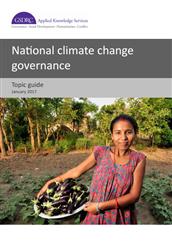Durban challenge
India faces the onerous task of balancing equity and environmental efficacy in the climate talks. It must not repeat the blunder that led to the Copenhagen disaster. THE climate conference in Durban, South
India faces the onerous task of balancing equity and environmental efficacy in the climate talks. It must not repeat the blunder that led to the Copenhagen disaster. THE climate conference in Durban, South
It is mainly the inhabitants of the global South who suffer from the effects of climate change. They are faced with the destruction of their living space and the violation of their human rights.
Indian companies seem to be shying away from making their carbon emission details public, according to a survey by a UK-based non-profit body. Only seven per cent of Indian firms give out complete and
Aid for trade and climate change financing may be addressing similar objectives. If used in a complementary and reinforcing manner, they may help build the economic resilience and supplyside capacity LDCs need to adapt and mitigate climate change and link to the world economy on better terms.
LIKE in other countries, stakeholders, who met at the just concluded 7th Climate Change Summit, organised by the Lagos State government has called for a need to create a Green Fund Initiative for the state.
Effects of climate change are frequently claimed to be responsible for widespread civil violence. Yet, scientists remain divided on this issue, and recent studies suggest that conflict risk increases with
An unprecedented 1.5 million Chinese children have participated in a painting competition on the topic of climate change, in a sign of the country's growing awareness of environmental issues. The competition, held in China for the first time, saw the children collectively submit 200,000 paintings on the theme of climate change. Some 620 paintings were selected for prizes by the jury, which was made up of renowned Chinese artists, UNEP officials and Ms Elizabeth Rihoy of Resource Africa.
The global climate is changing rapidly and countries need clear direction on how best to adapt to these changes. Ecosystem-based adaptation (EbA) is becoming an increasingly popular strategy, especially
This paper synthesizes the findings of a study carried out by Ecoagriculture Partners and the International Institute for Environment and Development on behalf of the David and Lucile Packard Foundation to explore opportunities for sustainable development in East Africa.
Bhutan and India discussed the possibility of developing crops resistant to climate change, to keep agriculture apace with warmer global conditions.
Noting that economies of developing countries are impacted by climate change, the Prime Minister, Dr Manmohan Singh, on Monday pitched for greater cooperation between Asian and African countries to address
Climate change increasingly threatens the health of our planet and the stability of our economies at the local, regional and global levels. Many countries are already suffering from climate impacts—severe
Agriculture is now recognised as both contributing to and suffering from the negative effects of climate change. Farming accounts for as much as 32% of greenhouse gas emissions, if
The UNEP has released the Third African Environment Outlook (AEO-3) Summary for Policy Makers, commissioned by the African Ministerial Conference on the Environment (AMCEN). The report focuses on the links

This topic guide looks at climate change governance and the political economy of climate policy development and implementation at the national scale. It aims to help donor agency staff better support country
Why the Copenhagen climate accord has become a non-starter
Noting that the economies of developing countries are being impacted by climate change, Prime Minister Manmohan Singh on Monday demanded greater cooperation between Asian and African countries to address the challenge. “We need to tackle the short and long-term environmental challenges that our economies face,” the PM emphasised “in order to build a favourable international regime that will enable us to access funds and green technologies for rural growth.”
The objective of this study is to develop an integrated health forecasting model as part of the International Futures (IFs) modelling system.

Climate change is one of the most serious threats the world faces. It will affect all of us, but will have a disproportionate impact on millions of poor rural people.
Energy consumption in Africa is the lowest in the world, and per capita consumption has barely changed since 2000 shows a new Atlas released by the UN Environment and African Development Bank at the World